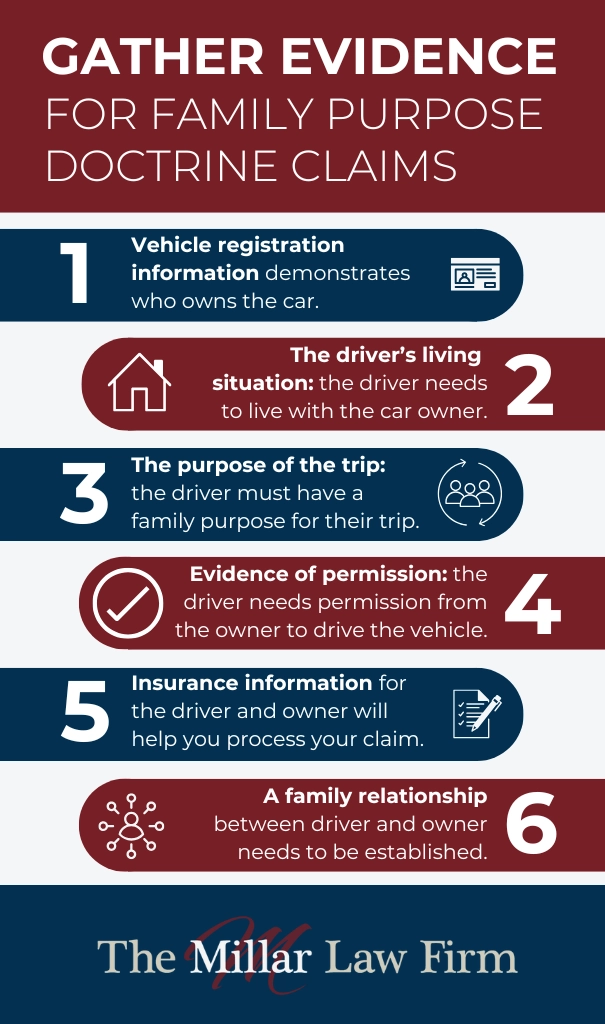Georgia Legal Guide: How the Family Purpose Doctrine Can Help You After Being Injured by a Family Car Driver
Key Points:
- You Can Sue the Car Owner, Not Just the Driver: Under specific conditions outlined by Georgia’s Family Purpose Doctrine, such as when the vehicle is used for family purposes, you can hold the vehicle owner responsible for your injuries, even if they weren’t in the car during the accident.
- Four Legal Requirements Must Be Met: To hold the car owner liable, the driver must have had permission to use the car, the owner must have relinquished control of the vehicle, the family member must have been driving, and the car must have been used for a family purpose.
- Access to Better Insurance Coverage: Under the Family Purpose Doctrine, you can access the car owner’s insurance, which typically has much higher limits, potentially $100,000 – $500,000+, compared to the minimum $25,000 many young drivers carry.
- Act Quickly to Protect Your Rights: You have two years to file a claim, but evidence disappears fast! Get information about both the driver and the car owner immediately after your accident.
“The young driver who hit me was driving his parent’s car – can I sue them for my injuries?”
If you’ve been injured in a car accident by someone driving their family’s vehicle, you may have various options for compensation. For example, Georgia’s “Family Purpose Doctrine” could allow you to hold the car owner responsible for your injuries, even if another family member drove it at the time. If you are able to fulfill the legal requirements of the doctrine, you will likely be entitled to better insurance coverage and full compensation for your medical bills, lost wages, and pain and suffering.
Table of Contents
What is Georgia’s Family Purpose Doctrine and How Does It Help You?
The Family Purpose Doctrine states that when a car owner maintains a car for their family’s use and convenience, they are then legally responsible for any accidents caused by family members driving the car for family purposes – even when the owner isn't present. If the at-fault driver meets the criteria of this doctrine, it can improve your chances of fair compensation.
This doctrine exists to protect injured victims by ensuring that the responsibility for safe vehicle operation is shared with the car owner, especially when the driver is young, inexperienced, or underinsured. (Chapter 59 - Requests to Charge, page 14)
When Can You Use Georgia’s Family Purpose Doctrine?
There are four main preconditions you must meet in order to utilize the Family Purpose Doctrine within a Georgia legal case:
- Permission: The car owner gave permission to the family member to drive.
- Relinquished Control: The car owner gave up control of the vehicle to the family member in question.
- Family Member Present: The family member was operating the vehicle during your accident.
- Family Purpose: The vehicle was being used for a family purpose when you were injured.
Most importantly, an "agency relationship" must exist between the owner and driver, meaning the owner had the authority and control over the vehicle's use, which is crucial for applying the Family Purpose Doctrine. (Gould v. Latorre, 227 Ga.App. 32, 34(3), 488 S.E.2d 116 (1997))

Real-World Examples: How This Could Apply to Your Case
Example 1: The Grocery Run Accident
Imagine you're driving home from your job in Stockbridge when an 18-year-old named Michaela runs a red light and T-bones your car with her father's SUV. You suffer a concussion, three broken ribs, and miss six weeks of work. Michaela was driving to pick up groceries for her family's dinner.
Without the Family Purpose Doctrine, you'd only be able to pursue Michaela’s personal insurance policy, which may have only minimal coverage limits – usually around $25,000. Your case fulfills the four requirements of the Family Purpose Doctrine; therefore, it is likely that Michaela's father’s (the car owner) insurance coverage becomes primary and covers your damages while the child’s coverage applies as excess auto coverage.
Example 2: The College Commute Crash
You're stopped at a traffic light in McDonough when 20-year-old Chad rear-ends you while driving his mother Helen's sedan. You suffer herniated discs requiring surgery and months of physical therapy. Chad drove home from his college classes, using the family car that Helen provided for his education.
Unfortunately for you, Chad does not own the car and only has a basic insurance policy with $30,000 in coverage, which is nowhere near enough for your $150,000 in medical bills and lost wages.
However, this case meets the four main criteria of the Family Purpose Doctrine, meaning Chad’s mother, who owns the vehicle, may have the primary coverage for the accident and her policy would pay first, while Chad’s policy pays secondarily as “other” or “non-owned vehicle” coverage.
These examples transform cases from claims against young adults with minimal assets to cases against car owners with additional, and often greater, insurance coverage. Taking into account whether your case meets the requirements of the Family Purpose Doctrine could mean the difference between partial compensation and full recovery for your injuries.
Why Georgia’s Family Purpose Doctrine Is Crucial for Your Recovery
Whether your accident has minimal resulting expenses or you have to compensate for a new vehicle, lost wages, and pain and suffering, the Family Purpose Doctrine may help your post-accident recovery go more smoothly. Here are the three main reasons to consider pursuing a legal case against the family car owner in your accident:
- Access to Additional Insurance: Family car owners (typically parents) may have additional vehicles in the household which, depending on the policy terms, may allow you to access more money to cover everything from medical bills to auto shop repairs.
- More Assets to Collect From: Parents and car owners generally have more financial resources than young drivers, improving your chances of actually collecting any judgment you win.
- Protection Against Underinsured Drivers: Young drivers often carry only the minimum insurance required by law, which may not come close to covering you if you have more serious injuries.
What Evidence Should You Gather?
Collect this information so that you can prove the main requirements of the Family Purpose Doctrine are met:
- Vehicle registration information demonstrates who owns the car (as opposed to who is actively driving the car at the time of the accident).
- The driver's living situation is a crucial piece of information. Typically, the driver must be living with the car owner for the Doctrine to apply to your case.
- The purpose of the trip determines whether or not there is a family purpose for using the original owner’s car. For example, were they running errands, going to school, or doing family business?
- Permission evidence showcases whether the driver had permission from the car owner to use the car.
- Insurance information for both the driver and the car owner. In general, it is a good practice to always gather insurance information at car accidents.
- A family relationship between the driver and owner needs to be established.
Limitations You Should Know About
There are further restrictions on utilizing the Family Purpose Doctrine, which doesn't apply in every situation involving family vehicles:
- Independent adult children must still live in the owner's household and use the car for family purposes. (Chapter 47 - Tort Liability, page 10)
- In-laws are generally not considered "family members" under this doctrine.
- Employment situations may determine whether the doctrine applies to your accident. For example, if the family member who caused your car accident was driving a vehicle for a work-purpose, the Family Purpose Doctrine is unlikely to apply.
- Unauthorized third parties are usually held liable over the owner. If the family member borrowing the car lets someone else drive alone without the owner’s knowledge, the owner may not be liable.
Steps to Protect Your Rights
If you've been injured by someone driving a family vehicle, make sure you take the following steps to ensure you get the settlement you need to cover expenses and take care of your family:
- Get complete information: Obtain details about both the driver and the vehicle owner, including insurance information.
- Don't settle quickly: The driver's insurance company may offer a quick settlement to avoid Family Purpose Doctrine claims, which can lead to larger settlements for you if applicable to your case!
- Investigate relationships: Determine if the driver lives with the owner and was on family business.
- Determine the trip purpose: Find out where the driver was going and why so you know if the trip was for family matters. If the at-fault driver’s mother or father show up at the scene of the accident, this can be a clue that the Family Purpose Doctrine may apply. Also, Police body and patrol-car cameras can be valuable evidence, as the police officer may have interviewed the driver to ask what he or she was doing at the time of the crash.
- Preserve evidence: Take photos, get witness statements, request video and 911 recordints, and save all documentation.
Consult an attorney immediately: These cases have complicated legal requirements and time limits, so it is advisable to seek legal aid to help you navigate the complex landscape.
Maximize Your Recovery Potential
Understanding and utilizing Georgia's Family Purpose Doctrine could be the key to receiving full compensation for your injuries. Instead of being limited to a young driver's minimal insurance, you may be able to access a car owner's substantial coverage and assets.
Don't let insurance companies convince you that the driver is your only option for recovery. If the at-fault driver was using a family vehicle, you may have significantly more compensation available than you initially thought.

 1201 West Peachtree Street #2339 Atlanta, GA 30309+1-770-212-3795$0-$100000
1201 West Peachtree Street #2339 Atlanta, GA 30309+1-770-212-3795$0-$100000The Millar Law Firm continues to go out of their way to support Clayton County teachers. From providing pencils to headphones for virtual learning, they remain responsive to the needs of our community! Thank you all for everything you have done and will continue to do in the future.

Probably not under the Family Purpose Doctrine, since adult children who live independently typically don't qualify. However, you might still have a negligent entrustment claim if the parents knew their child was a dangerous driver.
No, if the driver was acting as an employee for another person or entity rather than for family purposes, the doctrine typically does not apply.
Permission can be proven through various pieces of evidence, including the driver's regular use of the vehicle, availability of keys, and family testimony. Even implied permission may be sufficient for the Family Purpose Doctrine to apply to your case.
Yes, under Georgia law under certain circumstances you can pursue claims against multiple parties responsible for your injuries. Your case against the car owner, however, still necessitates that you fit the requirements of the Family Purpose Doctrine.
Settlements vary greatly; car owners often carry insurance limits of $100,000 to $500,000+, whereas young drivers may have only around $25,000 in coverage. If you are dealing with substantial injuries following the accident, the difference in these limits can determine your ability to support your family and recover.
Although you generally have two years from the date of injury under Georgia's statute of limitations for personal injury claims (O.C.G.A. § 9-3-33), act promptly! Evidence disappears quickly and witnesses' memories become more unreliable. If possible, evidence should be gathered immediately following an accident to ensure the strongest legal case possible.
Insurance companies often deny these claims to limit exposure and pressure you to settle for less. If you run into a situation like this, an experienced attorney can help prove the necessary elements of the Doctrine and fight for your right to access the car owner's coverage under Georgia law.















